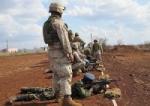Wall Street Journal
November 21, 2007
Pg. 18
Petraeus's Iraq
By Robert H. Scales
BAGHDAD, IRAQ -- I've just returned from a week in Iraq with Gen. David Petraeus and his operational commanders. My intent was to look at events from an operational perspective and assess the surge. What I got was a soldier's sense of what's happening on the ground and, although the jury is still out on the surge, I came to the conclusion that we may now be reaching the "culminating point" in this war.
The culminating point marks the shift in advantage from one side to the other, when the outcome becomes irreversible: The potential loser can inflict casualties, but has lost all chance of victory. The only issue is how much longer the war will last, and what the butcher's bill will be.
Battles usually define the culminating point. In World War II, Midway was a turning point against the Japanese, El Alamein was a turning point against the Nazis and after Stalingrad, Germany no longer was able to stop the Russians from advancing on their eastern front. Wars usually culminate before either antagonist is aware of the event. Abraham Lincoln didn't realize Gettysburg had turned the tide of the American Civil War. In Vietnam, the Tet offensive proved that culminating points aren't always military victories.
Culminating points are psychological, not physical, happenings. The commanders I spoke to in Iraq all said that there had been a remarkable change of mood in February when Gen. Petraeus announced that they were taking the fight to the enemy by taking Baghdad from al Qaeda. He pushed soldiers out of the big (and relatively safe) forward operating bases and scattered them among really bad neighborhoods. These joint security stations and combat outposts attracted locals and encouraged them to pass on intelligence about the enemy.








 "A Sherman can give you a very nice... edge."- Oddball,
"A Sherman can give you a very nice... edge."- Oddball, 





Bookmarks